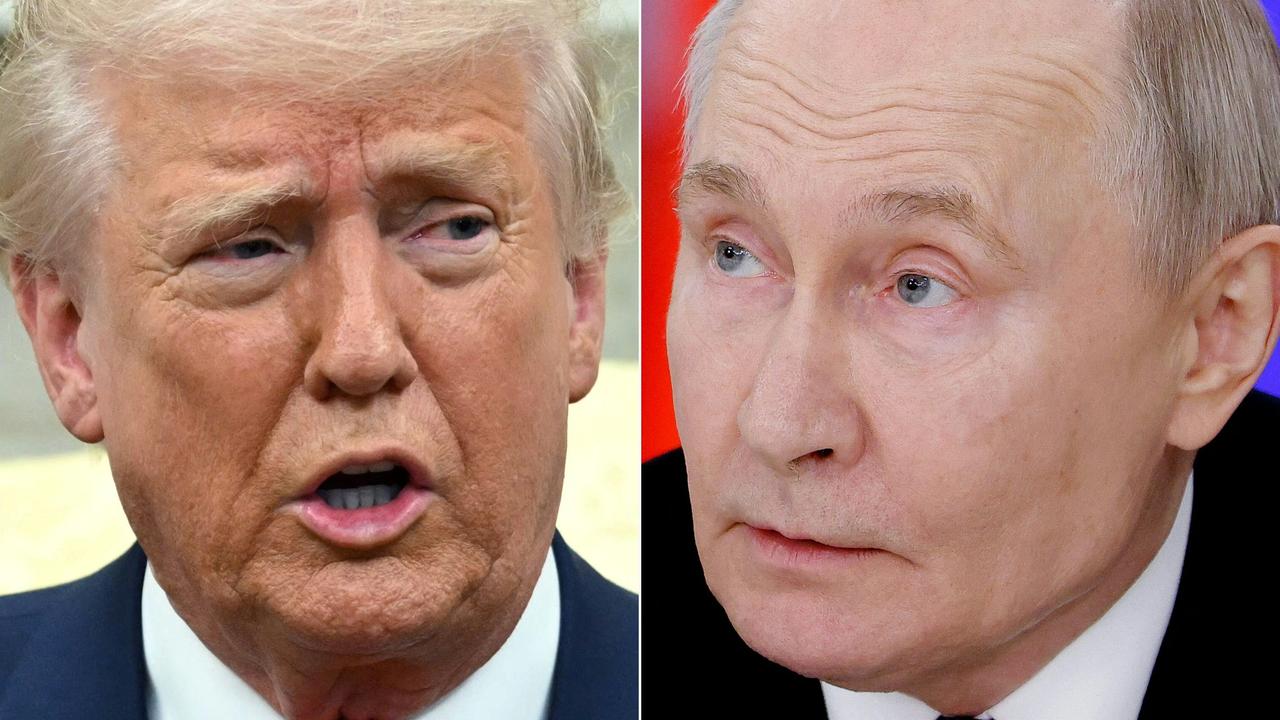Anthony Albanese joins APEC leaders for group photo
Anthony Albanese has joined world leaders at APEC for the traditional family photo, which fell flat for one major reason.
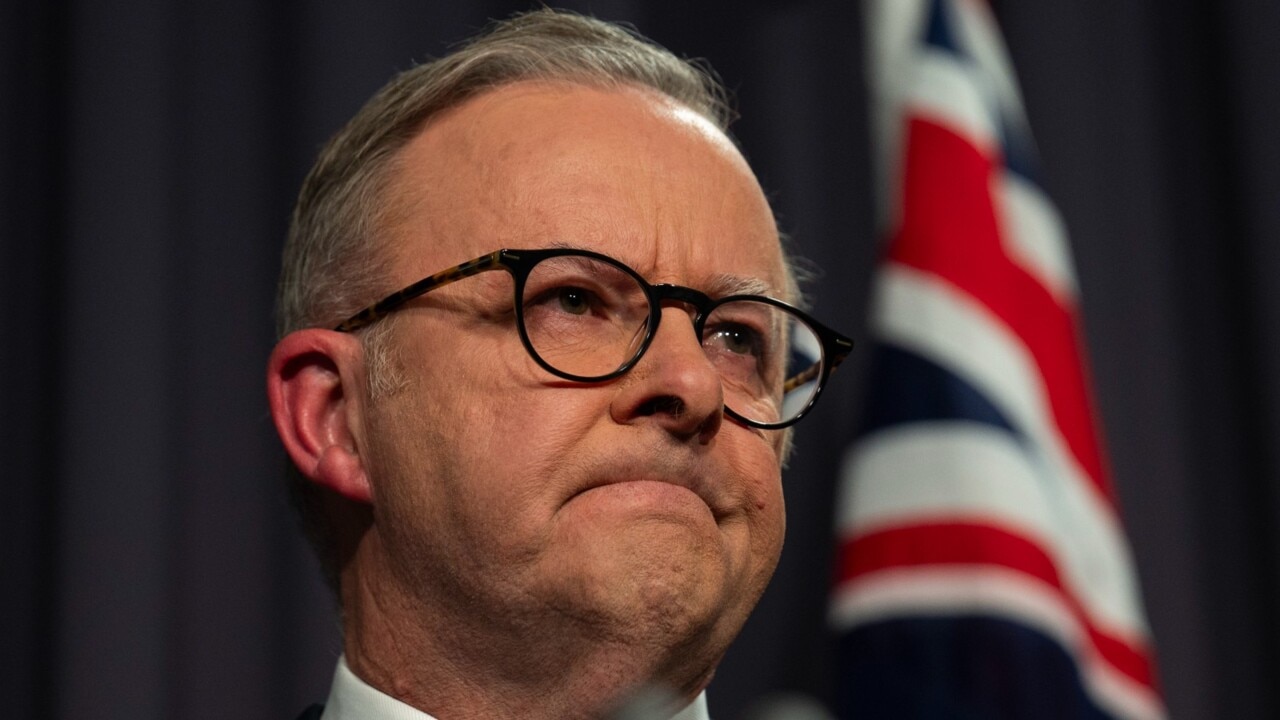
World
Don't miss out on the headlines from World. Followed categories will be added to My News.
The APEC leaders have ditched the tradition of donning local garb for their family photo in San Francisco.
The summit had become renowned for prime ministers and presidents being dressed in outfits chosen by the host country, such as when John Howard arranged Driza-Bone coats for the leaders at APEC in Sydney in 2007.
But the leaders opened the summit in the US on Thursday (local time) in their usual business attire.
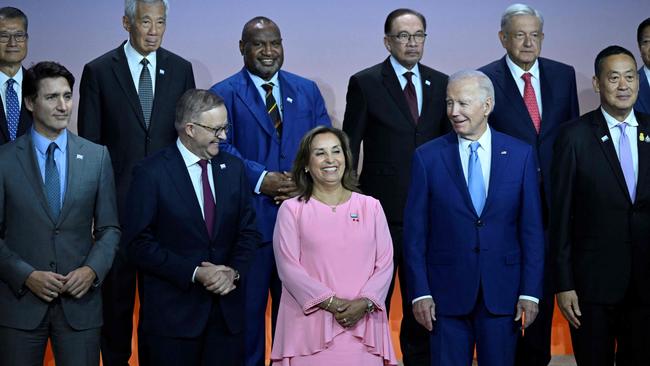
Prime Minister Anthony Albanese posed between Canadian Prime Minister Justin Trudeau and Peru’s President Dina Boluarte, who will host the summit next year.
He was earlier spotted asking an official photographer to take his picture with his phone upon arriving at the summit venue.
Prime Minister Anthony Albanese arrives at the APEC summit in San Francisco — and makes sure the official photographer takes a happy snap for him on his iPhone. pic.twitter.com/3bm96rlrFl
— Tom Minear (@tminear) November 16, 2023
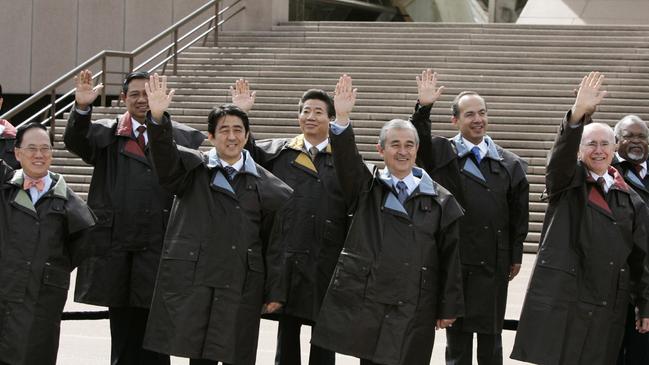
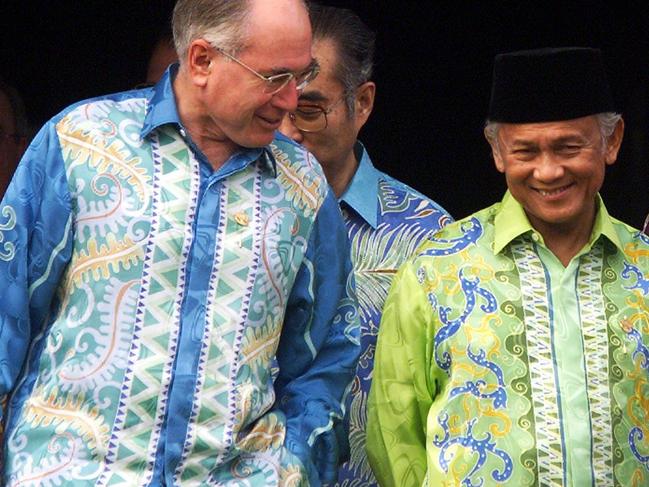
Inside APEC: Watch Tom Minear’s video below:
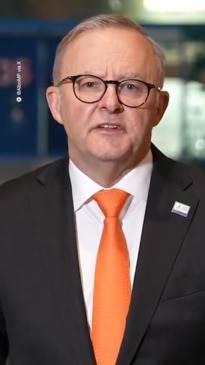
Mr Albanese held talks on the sidelines of the summit with Mr Trudeau on issues including climate change and the wars in Israel and Ukraine.
They focused particularly on the risk of bushfires after a horror period in Canada, and Mr Albanese said he was “very worried about our upcoming summer”.
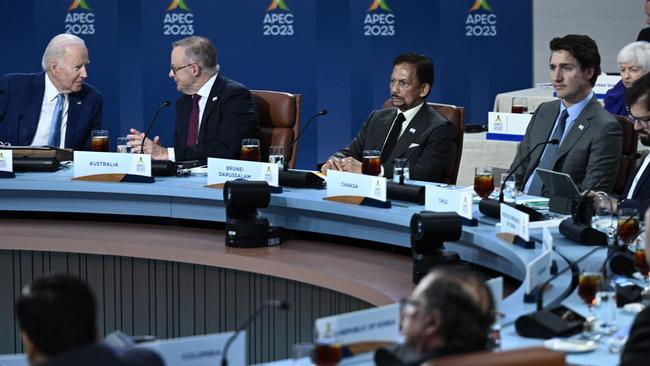

“We have all the conditions that were there prior to 2019/20. Indeed, the fact that that period has gone means you’ve got the growth of just about the right size elements, conditions to really be concerned with a very hot, dry period coming up,” he said.
Mr Trudeau said there was “never a shortage of things to agree on” with his Australian friend.
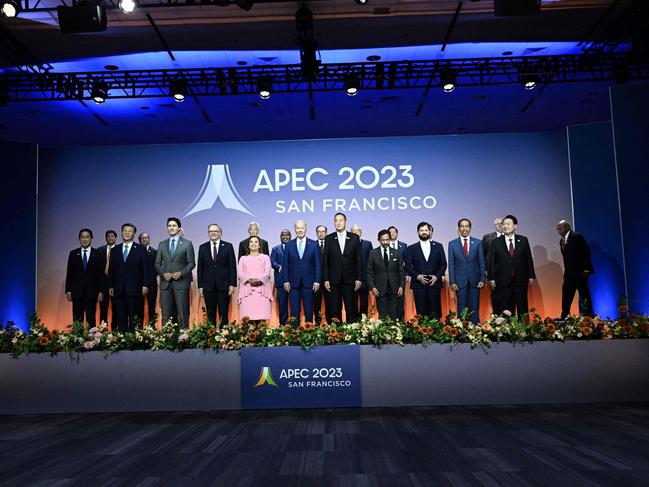
‘IT’S IMPORTANT I’M HERE’
It comes after Mr Albanese defended his attendance at the APEC summit, saying the San Francisco talkfest will provide crucial leadership on challenges such as soaring power bills.
While Opposition Leader Peter Dutton urged the Prime Minister to cancel his 18th overseas trip in 18 months, Mr Albanese said he was “very pleased” to accept US President Joe Biden’s invitation, returning to America three weeks after his state visit.
“At a time of global uncertainty, it is important that I’m here at APEC,” he said.
“I really look forward to forging new relationships in Australia’s national interest but also renewing relationships and cementing them as well.”
The Prime Minister will use an address to fellow world leaders – including Mr Biden and Chinese President Xi Jinping – on Thursday (local time) to say that “we all look to APEC for leadership on the challenges our economies face”.
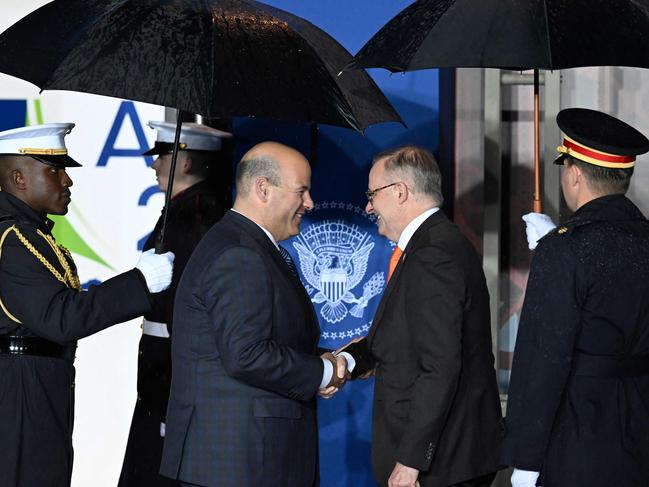
Pointing to how Russia’s invasion of Ukraine continues to “drive volatility in global energy prices”, Mr Albanese is expected to say that “global challenges require global solutions”.
“By working together, we can turn these challenges into security and opportunities for all our people,” he will say, while also welcoming the Biden’s administration push for APEC members to “raise the ambition on clean energy targets”.
Upon his arrival in San Francisco, Mr Albanese met with Microsoft boss Satya Nadella and announced that Australian public servants would be equipped with the tech giant’s artificial intelligence tool, which it boasts is the “most powerful productivity tool on the planet”.
The six-month trial of Microsoft 365 Copilot – which writes documents, analyses data, develops presentations, summarises meetings and automates emails – will make the Australian government one of the first in the world to put generative AI tools into action.
Mr Albanese said that from January, the Digital Transformation Agency would spearhead the effort “to innovate and enhance productivity to deliver better government services for the Australian people”, before the potential expansion of the tool across the public service.
“By strengthening our partnership with Microsoft, we are charting a course for the future of public service,” he said.
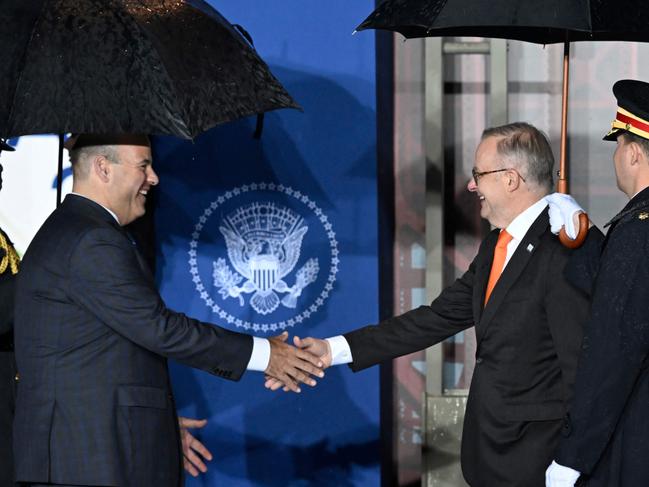
Microsoft’s Australian managing director Steven Worrall vowed to help the government “unlock the power of generative AI in a way that’s safe, secure and responsible”, enabling public servants to accelerate basic tasks and boost productivity.
Mr Albanese enjoyed APEC’s lavish opening reception on Wednesday night, part of what he said was a “very busy” two-day agenda featuring meetings with Canadian Prime Minister Justin Trudeau, Thailand’s new leader Srettha Thavisin, Californian Governor Gavin Newsom and US investment giant BlackRock’s chief Larry Fink.
The Prime Minister said APEC was an “Australian creation” and its work was in the country’s national interest.
“All of these economies are our major trading partners … One in four Australian jobs depends upon our trade, and an enormous proportion of that trade is represented here at APEC,” he said.
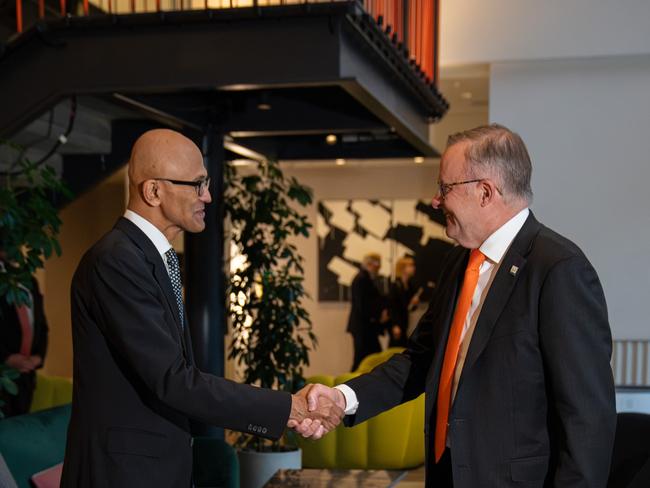
BIDEN, XI REACH DEAL ON MILITARY TALKS
The United States and China have agreed to restart communication between their military forces to avoid conflict, with Joe Biden saying Xi Jinping “fully understands” America’s effort to deter China’s aggression including with the AUKUS pact.
But while both sides hailed the four-hour meeting in San Francisco as constructive and productive, the presidents remained far apart on Taiwan, with China demanding the US “stop arming Taiwan” because its reunification with the mainland was “unstoppable”.
Mr Xi, on his first visit to the US since 2017, also struck a deal with Mr Biden to limit the flow of Chinese precursor chemicals for fentanyl – the opioid that is the leading killer of Americans aged 18 to 45 – and restarted co-operation on climate and artificial intelligence.
The meeting ended a tense and lengthy diplomatic freeze between the superpowers, with the US President saying they agreed that if they had concerns in the future, they would “pick up the phone and call one another”.
While Mr Biden maintained the Chinese President was a dictator and refused to say if he trusted him, he said he understood his “modus operandi” and that he had “been straight” with him.
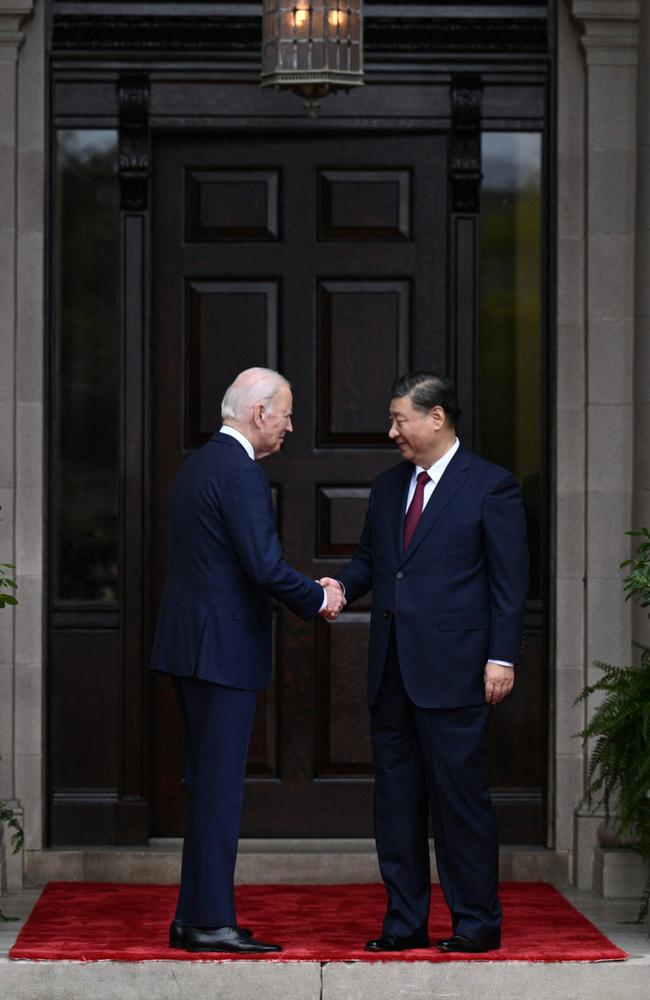
Mr Xi sounded a surprisingly positive note prior to their talks, saying: “I firmly believe in the promising future of the bilateral relationship.”
“Conflict and confrontation has unbearable consequences for both sides,” he said.
“Planet Earth is big enough for the two countries to succeed, and one country’s success is an opportunity for the other.”
The resumption of military-to-military communication was a critical priority for the US, which Anthony Albanese also raised with Mr Xi on his trip to Beijing earlier this month.
“We need to put in place those mechanisms that are important guardrails,” the Prime Minister said in San Francisco.
“We need guardrails to make sure that we don’t have misunderstandings or miscalculations that could lead to real issues and real conflict.”
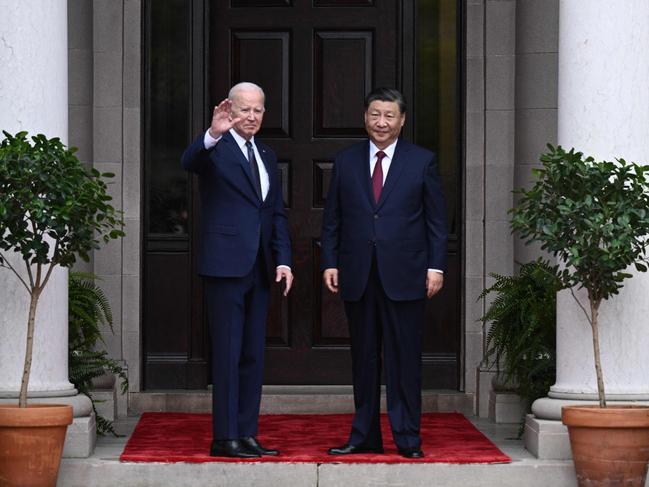
Mr Biden agreed, saying: “Miscalculations on either side can cause real trouble with a country like China.”
“We’re in a competitive relationship … but my responsibility is to make this rational and manageable so it doesn’t result in conflict,” he said.
Asked if he had issued any warnings to Mr Xi, Mr Biden pointed to the AUKUS submarine agreement with Australia and the Quad alliance, saying: “Our actions speak louder than our words. He fully understands.”
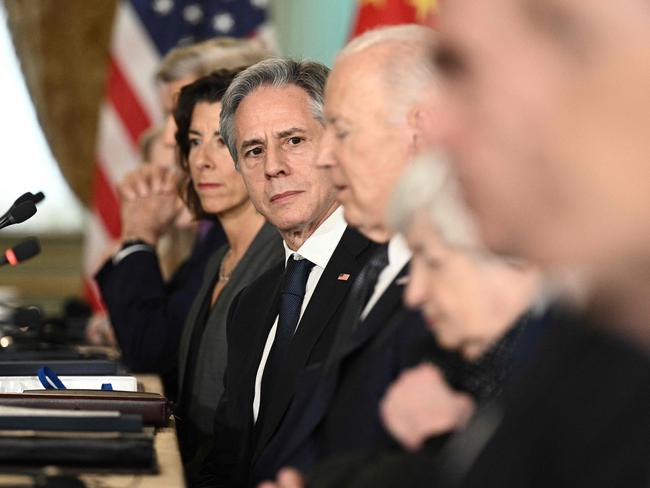
The US President said the pair “made some important progress”, although the meeting produced no major or unexpected breakthroughs.
He raised concerns about the unjustified detention of US citizens, human rights abuses, and China’s behaviour in the South China Sea, while also telling Mr Xi that he “didn’t expect any interference” in Taiwan’s presidential election in January.
“I reiterate what I’ve said since I’ve become president … that we maintain agreement that there is a One China policy, and I’m not going to change that,” Mr Biden said.
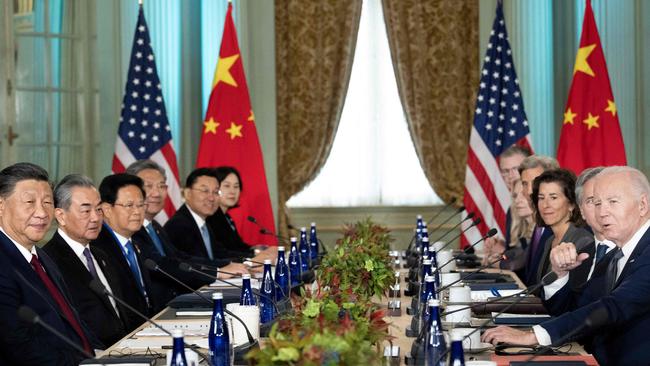
But Chinese Foreign Ministry spokeswoman Hua Chunying said Taiwan was the “most important and sensitive issue” and demanded that the US “take real actions to honour its commitment of not supporting Taiwan independence”.
“China will realise reunification, and this is unstoppable,” she said in a statement.
She said China had “red lines that must not be crossed”, and that both countries needed to “refrain from flip-flopping, being provocative, and crossing the lines”.
But the spokeswoman ultimately praised the meeting for having “charted the course for improving and developing US-China relations”.
“San Francisco should be a new starting point for stabilising US-China relations,” Ms Hua said.
More Coverage
Originally published as Anthony Albanese joins APEC leaders for group photo
Read related topics:Anthony Albanese




